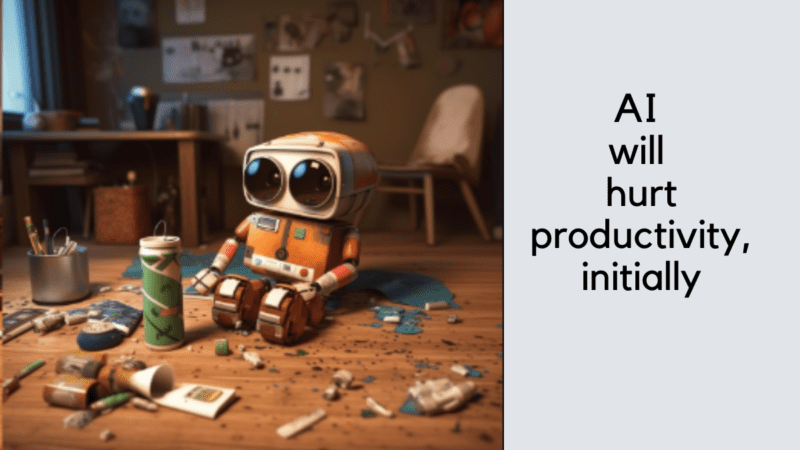There is no way around it. AI is in the consumer realm. And as with most changes, there are three camps.
- Those saying no/never/not on my watch
- Others saying maybe/let’s see/might be good
- And all in/changes everything/nothing will be the same
To be honest, I’m in the middle camp. I’ve now been playing around with it for 6 months now. Long enough to form an opinion that AI will hurt your productivity, initially. I explain why in today’s episode of Do Not Listen to this Podcast.
The main reason is that you have Bard and Open AI chat GPT 4.
Meaning if you try something in one you will have to check to see if the other gave you a better idea.
Support the Podcast. Help us feed stray cats and dogs.
The Initial Impact of AI on Productivity: A Double-Edged Sword
There’s no sugarcoating it – the integration of Artificial Intelligence (AI) into our lives, especially the consumer sphere, will initially result in a dip in productivity. As is the case with most transformative changes, there are three main reactions we typically observe.
Firstly, we have the resistance camp, those exclaiming, “Not a chance, not under my supervision.”
Next, we have the cautiously optimistic group murmuring, “Perhaps, let’s observe and evaluate.”
Finally, there are the radical enthusiasts proclaiming, “This is revolutionary, nothing will ever be the same again.”
Personally, I find myself aligning more with the second group. I’ve been dabbling in AI for half a year now, and I believe I’ve garnered enough experience to confidently state that AI will indeed negatively impact your productivity, at least initially. Today’s edition of ‘Do Not Listen to this Podcast’ delves into why this is the case.
The crux of the issue lies in the existence of multiple AI platforms like Bard and OpenAI’s GPT-4. This means if you experiment with one platform, there’s an inherent need to cross-check with the other to see if it might have yielded a superior idea. The process, while potentially enriching, can be time-consuming and initially hamper your productivity.
Here’s the Bard rewrite
Will AI Hurt Your Productivity?
Artificial intelligence (AI) is rapidly becoming a part of our everyday lives. From smartphones to self-driving cars, AI is changing the way we live and work. But what impact will AI have on our productivity?
There are three camps when it comes to AI and productivity:
- The “no” camp believes that AI will never be able to replace human workers. They argue that AI is too limited and can only perform a narrow range of tasks.
- The “maybe” camp believes that AI has the potential to increase productivity, but only if it is used correctly. They argue that AI can automate tasks that are currently done by humans, freeing up time for more creative and strategic work.
- The “all in” camp believes that AI will revolutionize the way we work. They argue that AI will eventually be able to do everything that humans can do, and even better.
I believe that the truth lies somewhere in the middle. While AI has the potential to increase productivity, it is also likely to lead to some initial disruption. This is because AI will change the way we work and the way we think about work.
For example, AI will make it possible to automate many of the tasks that are currently done by humans. This could lead to job losses in some industries, but it could also lead to increased productivity in others.
In addition, AI will make it possible to do things that were previously impossible. For example, AI can be used to analyze large amounts of data in real-time, which can help businesses to make better decisions.
Overall, I believe that AI will have a positive impact on productivity in the long run. However, there will be some initial disruption as we adapt to this new technology.
In my opinion, one of the biggest challenges that we will face as we adopt AI is the issue of choice. There are now so many different AI tools and platforms available, it can be difficult to know which ones to use. This can lead to wasted time and resources as we try out different tools and compare their results.
Another challenge is the issue of trust. We need to be able to trust that AI tools are accurate and reliable. If we don’t trust the results that we are getting, we are less likely to use AI tools and we will miss out on the potential benefits that they offer.
Overall, I believe that AI has the potential to increase productivity, but we need to be aware of the challenges that we will face as we adopt this new technology. By addressing these challenges, we can ensure that AI is used to its full potential and that it benefits everyone.
Here are some tips for using AI to increase your productivity:
- Focus on tasks that are repetitive or time-consuming. AI can be used to automate these tasks, freeing up your time for more important work.
- Use AI to analyze data. AI can be used to analyze large amounts of data in real-time, which can help you to make better decisions.
- Use AI to generate ideas. AI can be used to generate new ideas, which can help you to be more creative and innovative.
- Use AI to collaborate with others. AI can be used to collaborate with others, even if they are located in different parts of the world.
By following these tips, you can use AI to increase your productivity and achieve your goals.

Leave a Reply